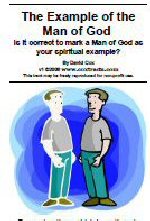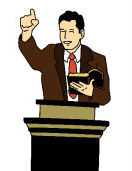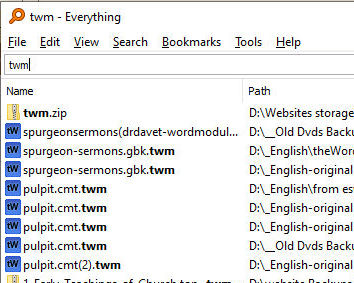OT Testimonies
The very name of “Jesus” means Jehovah is Salvation.
“And the Father himself, which hath sent me, hath borne witness of me. Ye have neither heard his voice at any time, nor seen his shape” (John 5:37). The miracles performed by our Lord were not the only nor the most direct evidence which proved His Deity. The Father Himself had borne witness. The majority of the commentators refer this to the baptism of Christ, when the Father’s voice declared, “This is my beloved Son, in whom I am well pleased.” But we scarcely think this is correct. Immediately following, our Lord went on to say, “Ye have neither heard his voice at any time, nor seen his shape.” What, then, would be the force of Christ here appealing to the Father’s witness at the Jordan if these detractors of His had not heard that Voice? Personally, we think that Christ refers, rather, to the witness which the Father had borne to His Son through the prophets during Old Testament times. This seems to give more meaning to what follows—the Old Testament economy was characterized by an invisible God, neither His voice being heard, nor His shape seen. Arthur Pink – Exposition of the Gospel of John, Chapter 19.
“Do not think that I will accuse you to the Father: there is one that accuseth you, even Moses, in whom ye trust. For had ye believed Moses, ye would have believed me: for he wrote of me” (John 5:45, 46). Our Lord concludes by intimating to these Jews that they would yet have to give an account of their rejection of Him before the tribunal of God, and there they would see as their accuser the great legislator of whom they boasted, but whose testimony they rejected. Here, then, was the final reason why they would not come to Him for life—they believed not the written Word of God.
“There is one that accuseth you, even Moses, in whom ye trust. For had ye believed Moses, ye would have believed me: for he wrote of me.” How solemn and searching is this! If there is one thing those Jews thought they believed, it was Moses and his writings. They contended earnestly for the law: they venerated the name of Moses above almost all of their national heroes. They would have been ready to die for what Moses taught. And yet here is the Son of God solemnly declaring that these Jews did not believe Moses, and furnishing proof by showing that if they had really believed Moses’ writings they had believed in Christ, of whom Moses wrote. How terribly deceptive is the human heart! “There is a way that seemeth right unto a man, but the end thereof are the ways of death” (Prov. 14:12). O, dear reader, make certain that you believe, really, savingly believe on the Son of God.
“But if ye believe not his writings, how shall ye believe my words?” (John 5:47). How this exposes the “Higher Critics!” If they believe not the writings of Moses, no matter what their ecclesiastical connections or religious professions, it is sure proof that they are unsaved men—men who have not believed in Christ. The Old Testament Scriptures are of equal authority with the teaching of Christ: they are equally the Word of God. Arthur Pink – Exposition of the Gospel of John, Chapter 19.
Contents
NT Testimonies
The NT apostles and disciples captured the mission and person of Jesus Christ. Here we see a multitude of testimonies but all of them center on a few central key concepts that was widely shared, and emphatically preached by the NT Church.
Essentially the situation was this: First, the one nerve of the whole matter is that these Christian men had been saved from sin. Seize that fact with all your strength, or you will never comprehend this mighty battle. Second, this salvation from sin they absolutely associated with Jesus Christ and his atonement. Third, they had inherited their Saviour’s own interpretation of the relation existing between his redemptive work and the intrinsic peculiarity of his person. Fourth, this consciousness of our Lord they found essentially repeated in the whole body of apostolic experience, the repetition gaining in force and completeness from first to last.
Fifth, this inheritance from Christ and his apostles exactly fitted and satisfied their own Christian consciousness which was resultant from their own Christian experience. Sixth, out of this combination of features they had gained a conception of Christ which they spontaneously expressed by worshiping him even as they worshiped God. This is a fair practical statement of the inner situation; and it all can be gathered up into a sentence: While up to this time they had no metaphysical view (the most of them) of Jesus Christ, yet, in their redemptional experience, they so regarded him that their hearts went out to him in full worship. Olin Alfred Curtis (1850-1918) – The Christian Faith chapter 16 (1905)
“Search the scriptures; for in them ye think ye have eternal life: and they are they which testify of me” (John 5:39). This is the last witness which our Lord cites, and, for us, it is the most important. John has long since passed away; the “words” of Christ are no longer before men’s eyes; the voice of the Father is no more heard; but the testimony of the Scriptures abides. The Scriptures testified of Christ, and affirmed His Deity. Their witness was the climax. The Holy Writings, given by inspiration of God, were the final court of appeal. What importance and authority does He attach to them! Beyond them there was no appeal: above them no higher authority: after them no further witness. It is blessed to note the order in which Christ placed the three witnesses to which He appealed in proof of His equality with God. First, there was the witness of His own Divine works. Second, there was the witness which the Father had borne to Him through the prophets. Third, there was the testimony of the Holy Scriptures, written by men moved by the Holy Spirit. Thus in these three witnesses there is a remarkable reference made to each of the three Persons in the Holy Trinity.
“Search the Scriptures” was both an appeal and a command. It is to be read, as in our A.V., in the imperative mood. The proof for this is as follows: First, the usage of the word. The Bible is its own interpreter. If scripture be compared with scripture its meaning will be plain. In John 7:52 we find the only other occurrence of the Greek word (ereunao) in John’s Gospel, here translated “search”; “They answered and said unto him, Art thou also of Galilee? Search, and look: for out of Galilee ariseth no prophet.” When the Pharisees said to Nicodemus “Search and look,” they were bidding him search the Scriptures. Thus, in both instances, the word has the imperative and not the indicative force. Again; to give the verb here the indicative force in John 5:39 is to make the first half of the verse pointless; but to render it in the imperative gives it a meaning in full accord with what precedes and what follows. “For in them ye think ye have eternal life.” The pronoun “ye” is emphatic. The word “think” does not imply it was a doubtful point, or merely a matter of human opinion. It is rather as though Christ said unto them, ‘This is one of the articles of your faith: ye think (are persuaded), and rightly so; then act on it. Search the Scriptures (in which you are assured there is eternal life) and you will find that they, too, testify of Me.’ The word “think” does not imply a doubt, but affirms an assurance. (Cf. Matthew 22:42, etc.).
“Search the Scriptures.” Here is a command from the Lord. The authority of His Godhood is behind it. “Search,” He says; not merely “read.” The Greek word is one that was used in connection with hunting. It referred to the hunter stalking game. When he discovered the tracks of an animal, he concentrated all his attention on the ground before him, diligently searching for other marks which would lead him to his quarry. In a similar way, we are to study God’s Word, minutely examining each expression, tracing every occurrence of it, and ascertaining its meaning from its usage. The grand motive for such earnest study is, that the Scriptures “testify” of Christ. May writer and reader give daily heed to this Divine admonition, to “Search” the Scriptures. Arthur Pink – Exposition of the Gospel of John, Chapter 19.
God the Father’s witness to God the Son
As we pass from chapter to chapter it is ever needful to keep in mind the character and scope of this fourth Gospel. Its chief design is to present the Divine glories of Christ. It was written, no doubt, in its first and local application to refute the heresies concerning the person of the Lord Jesus which flourished toward the end of the first century. Less than fifty years after the Lord departed from these scenes and returned to His Father in heaven, the horrible system of Gnosticism, which denied the essential Deity of the Savior, was spread widely throughout those lands where the Gospel had been preached. Whilst it was generally allowed that Christ was a unique personage, yet, that He was “equal with God” was denied by many. Nor is that very surprising when we stop to think how much there was which would prove a stumbling block to the natural man.
Outwardly, to human eyes, Christ appeared to be an ordinary man. Born into a peasant family; cradled amid the most humble surroundings; carried away into Egypt to escape the cruel edict of Herod, and returning later, only to grow to manhood’s estate in obscurity; working for years, most probably, at the carpenter’s bench—what was there to denote that He was the Lord of Glory? Then, as He began His public ministry, appearing not as the great of this world are accustomed to appear, with much pomp and ostentation; but, instead, as the meek and lowly One. Attended not by an imposing retinue of angels, but by a few poor and unlettered fishermen. His claims rejected by the religious leaders of that day; the tide of popular opinion turning against Him; the very ones who first hailed Him with their glad Hosannas, ending by crying, “Away with him: crucify him.” Finally, nailed in shame to the cruel tree; silent to the challenge to descend from it; and there breathing out His spirit—that, that was the last the world saw of Him.
And now by the year A. D. 90 almost all of His original disciples would be dead. Of the twelve apostles who had accompanied Him during His public ministry, only John remained. On every side were teachers denying the Deity of Christ. There was thus a real need for an inspired, authoritative, systematic presentation of the manifold glories of His divine person. The Holy Spirit therefore moved John—the one who of all the early disciples knew Christ best, the one whose spiritual discernment was the keenest, the one who had enjoyed the inestimable privilege of leaning on the Master’s bosom to write this fourth Gospel. In it abundant evidence is furnished to satisfy the most credulous of the Deity of the Lord Jesus. It is to the written Word God now refers all who desire to know the truth concerning His beloved Son, and in it are presented the “many infallible proofs” for the Godhood of our blessed Redeemer. Chiefest of these are to be found in John’s Gospel.
In the chapter we are now studying we find record of a remarkable miracle performed by the Lord Jesus which signally displayed His Divine power. He had singled out a most hopeless ease and by a word had made whole, instantly, one that had suffered with an infirmity for thirty and eight years. Because this miracle had been performed on the Sabbath day, the Jews persecuted the Lord Jesus. In gracious condescension the Lord replied to their criticism by giving them a sevenfold declaration of His equality with the Father. This we examined at some length in maintaining it, so immeasurable is the blessing when received, so tremendous is the stake involved in its loss, God has vouchsafed us the amplest, clearest, fullest evidence.
“If I bear witness of myself, my witness is not true” (John 5:31). Every commentator we have consulted expounds this verse as follows: The witness which I have just borne to Myself would not be valid unless it is supported by that of others. The law of God requires two or three witnesses for the truth to be established. Therefore if I bear witness of Myself, says Christ, and there is none to confirm it, it is “not true,” i.e., it is not convincing to others. But we most humbly dissent from any such interpretation. The word of a mere man does need confirmation: but not so that of God the Son. To affirm or suggest that His witness must be ratified by the testimony of others so as to establish its validity, is deeply dishonoring to Him. And we are both amazed and saddened that such a view should be put forth by many excellent men.
“If I bear witness of myself, my witness is not true.” The key to this verse lies in what has gone before. Divorce it from its context, and we must expect to find it difficult; but examine it in our last chapter; now, in the passage before us, we find that He closed by bringing in the evidence of various unimpeachable witnesses who testified to the veracity of His claims. In view, then, of what is to be found here, there can be no excuse whatever for ignorance, still less for unbelief, upon this all-important subject. So bright was Christ’s glory, so concerned was the Father in the light of its setting, and all becomes clear. This verse simply reiterates in another form what we find the Savior saying at the beginning of the previous verse, can of mine own self do nothing” means, I cannot act independently of the Father: I am so absolutely one with Him that His will is My will; mine, His. So, now, He declares, “If I bear witness of myself, my witness is not true.” He speaks hypothetically—”if.” “I bear witness of myself” means, If I bear witness independently of the Father. In such a case, “my witness is not true.” And why? Because such would be insubordination. The Son can no more bear witness of Himself independently of the Father, than He can of Himself work independently of the Father.
“There is another that beareth witness of me; and I know that the witness which he witnesseth of me is true” (John 5:32). This explains the previous verse and confirms our interpretation of it. The “other” who is here referred to as “bearing witness” of Him, is not John the Baptist, as some have strangely supposed, but the Father Himself. Reference, not appeal, is made to John in verses 33, 34. Observe now that our Lord did not here say, “There is One that beareth witness of me” and His witness is true, but “there is another that beareth witness of me.” He would no more dissever the Father and His witness from Himself, than He would bear witness to Himself independently of the Father. This is strikingly confirmed by what we read in John 8: “The Pharisees therefore said unto him, Thou bearest record of thyself; thy record is not true. Jesus answered and said unto them, Though I bear record of myself, yet my record is true… Ye judge after the flesh; I judge no man. And yet if I judge, my judgment is true: for I am not alone, but I and the Father that sent me” (verses 13-16).
“Ye sent unto John, and he bare witness unto the truth” (John 5:33). Here our Lord reminds “the Jews” (verse 16) how, when they had sent an embassy unto His forerunner (see John 1:19), that he “bear witness unto the truth.” Notice the abstract form in which this is put. Christ did not say, “He bear witness unto me,” but “unto the truth.” This witness is recorded in John 1:20-27. First, John confessed that he was not the Christ, but simply “the voice of one crying in the wilderness, Make straight the way of the Lord.” Then, he testified to the presence of One in their midst whom they knew not, One of whom he said, “He it is, who coming after me, is preferred before me, whose shoes latchet I am not worthy to unloose.” Such was the Baptist’s witness to the delegates of these same Jews.
“But I receive not testimony from man: but these things I say, that ye might be saved” (John 5:34). The Son of God continues to occupy the same high ground from which He had spoken throughout this interview. “I receive not testimony from man” shows that He had not appealed to the witness of John in confirmation of His own declarations. His purpose was quite otherwise: “These things I say, that ye might be saved.” The witness which John had borne to “the truth” was fitted to have a salutary effect on those who heard him. John’s testimony was a merciful concession which God had made to the need of Israel. Christ Himself did not stand in need of it; but they did. God sent His messenger before His Son to prepare the way for Him. His ministry was designed to arouse men’s attention and to produce in them a sense of their deep need of the One who was about to be manifested.
“But I receive not testimony from man.” This word “receive” is explained to us in verse 44 where it is interchanged with “seek.” It means to lay hold of, or grasp at. Christ would not bemean Himself by subpoening human witnesses. His claim to be equal with God rested on surer ground than the testimony of a man. But He had reminded these Jews of what John had said to their representatives on an earlier occasion, and this that they “might be saved,” for salvation comes by believing God’s “witness unto the truth.”
“He was a burning and a shining light: and ye were willing for a season to rejoice in his light” (John 5:35). This was most gracious of Christ. John had given faithful witness to the One who was to come after him; and now the Son of God bears witness to him. A beautiful illustration is this of the promise that if we confess Christ before men, so He will yet confess us before God. “A burning and shining light”—more correctly, “lamp,” see R.V.—the Lord calls him. Burning inwardly, shining outwardly. John’s light had not been hid under a bushel, but it had shone “before men.” Ah! dear reader, will the Savior be able to say of you, in a coming day, “He was a burning and shining lamp”? Is the light that is within thee “burning” or is it just flickering? Is your lamp “trimmed,” and so “shining,” or is it shedding but a feeble and sickly glow? Great is the need for burning and shining “lamps” in the world today. The shadows are fast lengthening, the darkness increases, and the “midnight” hour draws on apace. “And that, knowing the time, that now it is high time to awake out of sleep: for now is our salvation nearer than when we believed. The night is far spent, the day is at hand: let us therefore cast off the works of darkness, and let us put on the armor of light” (Rom. 13:11, 12).
“And ye were willing for a season to rejoice in his light” (John 5:35). This provides us with an illustration of the stony-ground hearers of the parable of the Sower. Concerning this class Christ says, “But he that received the seed into stony places, the same is he that heareth the word, and anon with joy receiveth it; Yet hath he not root in himself, but dureth for a while” (Matthew 13:20, 21). Such were these Jews: “for a season” they rejoiced in John’s light. But the difference between real believers and mere professors is not in how they begin but how they end. “He that endureth to the end shall be saved”: enduring to the end is not a condition of salvation, but an evidence of it. So, again, when Christ says, “If ye continue in my word, then are ye my disciples indeed:” continuing in Christ’s word is a proof that we are His disciples. We take it that which caused these Jews to “rejoice’’ for a season in John’s light, was the testimony which he bore to the Messiah, then about to appear. This was good news indeed, for to them this meant deliverance from the Roman yoke and the destruction of all their enemies. But when the Messiah was actually manifested He instead announced that He had come to save the lost, and when He demanded repentance and faith, their joy soon faded away.
“But I have greater witness than that of John: for the works which the Father hath given me to finish, the same works that I do, bear witness of me, that the Father hath sent me” (John 5:36). Here is the first witness to which Christ appeals in proof of His Deity. His “works” bore unmistakable witness to Him. He gave hearing to the deaf, speech to the dumb, sight to the blind, cleansing to the leper, deliverance to the captives of the Devil, life to the dead. He walked the waves, stilled the wind, calmed the sea, He turned water into wine, cleansed the Temple single-handed, and fed a great multitude with a few loaves and fishes. And these miracles were performed by His own inherent power. To these works He now directs attention as furnishing proof of His Deity. Quite frequently did He appeal to His “works” as affording Divine testimony: see John 10:25, 38; 14:11; 15:24. Arthur Pink – Exposition of the Gospel of John, Chapter 19.
More Free PDFs
William Carey



 Helpful Windows User Tip for "Searching Everything" on your PC.
Helpful Windows User Tip for "Searching Everything" on your PC.
